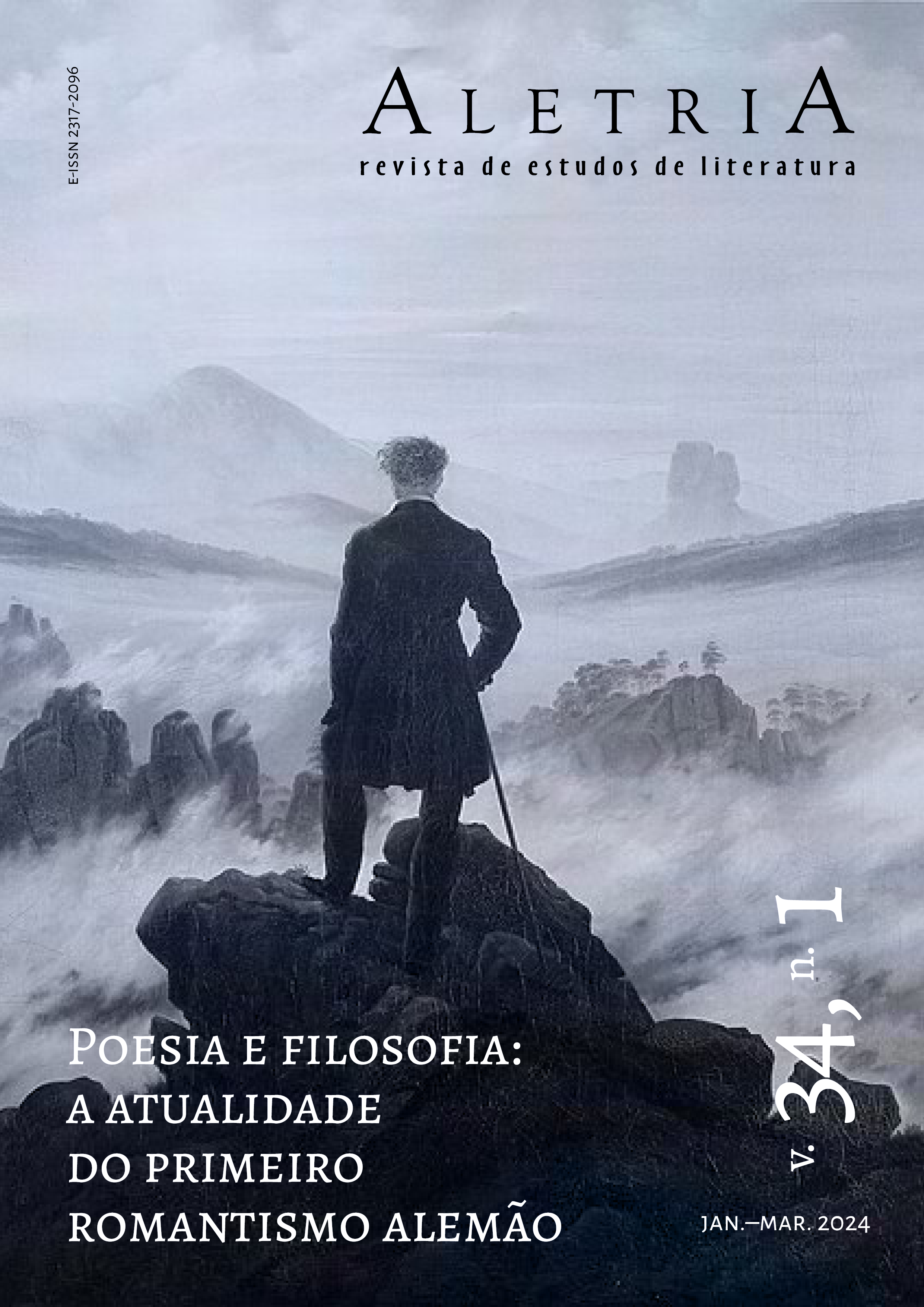Rilke and Poetic Religion
a Romantic Heritage
Keywords:
Octavio Paz, Romanticism, Rilke, finitude, poetry, consecrationAbstract
Starting from the assertions of Octavio Paz in Los hijos del limo, according to which “the death of God” is a Romantic theme, we explore how this mark of profound transformations unfolds in some moments of Rainer Maria Rilke’s work, specifically as an exacerbation of a trait that, according to Paz, stems from Romanticism: the idea of poetry as the “original religion”, of the poetic discourse as a “competitor” of the religious, and therefore, of the poet as prophet and priest. Now, however, without God, some reconfiguration becomes necessary. Heir to this Romantic tone, Rilke represented a Godless world and a possible path for poetry through the search for interiority and the attempt at a poetic work that, paradoxically, starting from the finitude, would create a divinity.
Downloads
References
CAMPOS, Augusto de. Coisas e anjos de Rilke. São Paulo: Perspectiva, 2001.
DRISCOLL, Kári. Towards a poetics of animality: Hofmannsthal, Rilke, Pirandello, Kafka. 2014. Thesis (Doctorate in Philosophy) – Graduate School of Arts and Sciences, Columbia University,
New York, 2014.
GUARDINI, Romano. Rainer Maria Rilkes Deutung des Daseins. Eine Interpretation der Duineser Elegien. München: Kösel, 1996.
LANGLOIS, Jose Miguel Ibáñez. Rilke, Pound, Neruda: três mestres da poesia contemporânea. São Paulo: Nerman, 1978.
MAN, Paul de. Alegorias da leitura: linguagem figurativa em Rousseau, Nietzsche, Rilke e Proust. Rio de Janeiro: Imago, 1996.
MOOSBURGER, Laura B. Posfácio. In: RILKE, Rainer Maria. Transitoriedade. Seleção, tradução, posfácio e notas: Laura B. Moosburger. São Paulo: Clandestina, 2018. p. 63-77.
NEVES, Margarida Braga. Rilke e(m) Sena. In: FURTADO, Maria Teresa Dias et al. (org.). Rilke 70 anos depois: Colóquio interdisciplinar. Lisboa: Colibri, 1996. p. 235-248.
PAZ, Octavio. Os filhos do barro: do romantismo à vanguarda. Tradução de Ari Roitman e Paulina Wacht. São Paulo: Cosac Naify, 2013.
RILKE, Rainer Maria. A melodia das coisas: contos, ensaios, cartas. Organização e tradução: Claudia Cavalcanti. São Paulo: Estação Liberdade, 2011a.
RILKE, Rainer Maria. As anotações de Malte Laurids Brigge. Tradução e prefácio: Maria Teresa Dias Furtado. Lisboa: Relógio D’água, 2003.
RILKE, Rainer Maria. Briefe aus den Jahren 1907 bis 1914. Herausgegen von Ruth Sieber Rilke und Carl Sieber. Leipzig: Insel, 1933.
RILKE, Rainer Maria. Cartas sobre Cézanne. Tradução e prefácio: Pedro Süssekind. Rio de Janeiro: Sette Letras, 1996.
RILKE, Rainer Maria. Cuarenta y nueve poemas. Seleção, tradução e introdução de Antonio Pau. Madrid: Trotta, 2014.
RILKE, Rainer Maria. Der Brief des jungen Arbeiters: aus den kleinen Schriften 1906-1926. Berlin: Suhrkamp, 1974.
RILKE, Rainer Maria. Elegias de Duíno. Tradução e comentários: Dora Ferreira da Silva. São Paulo: Globo, 2008.
RILKE, Rainer Maria. Nuevos Poemas I. Traducción, introducción y notas de Federico Bermúdez-Cañete. Madrid: Hiperión, 1991.
RILKE, Rainer Maria. O diário de Florença. Tradução e apresentação: Marion Fleischer. São Paulo: Nova Alexandria, 2011b.
RILKE, Rainer Maria. O livro de horas. Tradução e apresentação: Maria Teresa Dias Furtado. Lisboa: Assírio & Alvim, 2009.
RILKE, Rainer Maria. Oitava Elegia de Duíno – acompanhada de uma carta. Apresentação, tradução e notas de Vicente A. de Arruda Sampaio. Rapsódia, São Paulo, n. 6, p. 35-50, dez. 2012a. Disponível em: <https://www.revistas.usp.br/rapsodia/article/view/106536> Acesso em: 02 fev. 2018.
RILKE, Rainer Maria. Poemas. Seleção, tradução e introdução: José Paulo Paes. São Paulo: Companhia das Letras, 2012b.
RILKE, Rainer Maria. Poemas: As Elegias de Duíno e Sonetos a Orfeu. Prefácio, seleção e tradução: Paulo Quintela. Porto: O oiro do dia, 1983.
RILKE, Rainer Maria. Sämtliche Werke in drei Bänden. Herausgegeben von Horst Nalewski. Leipzig: Insel-Verlag, 1978.
ROSENFIELD, Kathrin; PEREIRA, Lawrence Flores. Rainer Maria Rilke e Paula Modersohn-Becker: um diálogo inspirador no Réquiem a uma Amiga. Pandaemonium Germanicum, São Paulo, v. 24, n. 44, p. 271-295, set./dez. 2021. Disponível em: <https://www.revistas.usp.br/pg/article/view/187704> Acesso em: 28 fev. 2023.
RYAN, Judith. Rilke, Modernism and Poetic Tradition. Cambridge: Cambridge University Press, 2004.
SILESIUS, Angelus. A rosa é sem porquê. Tradução e prefácio: José Augusto Mourão. Lisboa: Vega, 1991.
SILESIUS, Angelus. Aus des Angelus Silesius Cherubinischem Wandersmann.[S. l.: s. n.], 2015. Disponível em: <https://www.gutenberg.org/ebooks/48210>. Acesso: 01 jun. 2023.
Downloads
Published
How to Cite
Issue
Section
License
Copyright (c) 2024 Laura de Borba Moosburger (Autor)

This work is licensed under a Creative Commons Attribution 4.0 International License.
Authors who publish with this journal agree to the following terms:Authors retain copyright and grant the journal right of first publication with the work simultaneously licensed under a Creative Commons Attribution Non-Commercial No Derivatives License that allows others to share the work with an acknowledgement of the work's authorship and initial publication in this journal.Authors are able to enter into separate, additional contractual arrangements for the non-exclusive distribution of the journal's published version of the work (e.g., post it to an institutional repository or publish it in a book), with an acknowledgement of its initial publication in this journal.Authors are permitted and encouraged to post their work online (e.g., in institutional repositories or on their website) prior to and during the submission process, as it can lead to productive exchanges, as well as earlier and greater citation of published work (See The Effect of Open Access).





